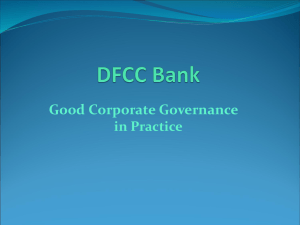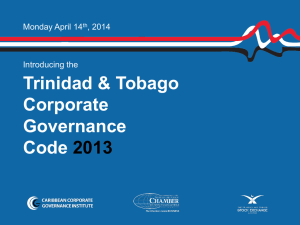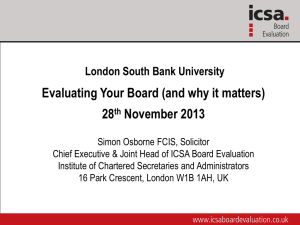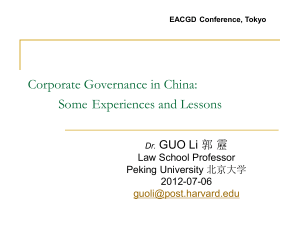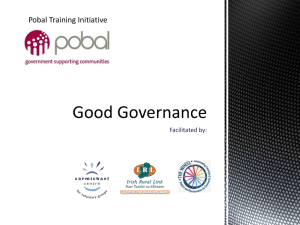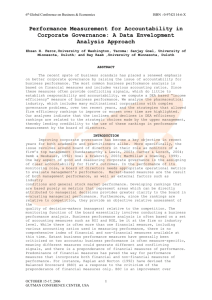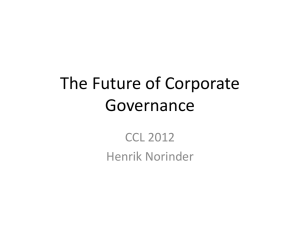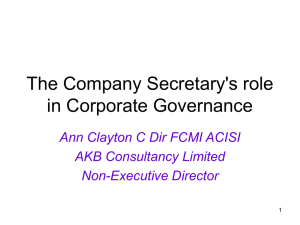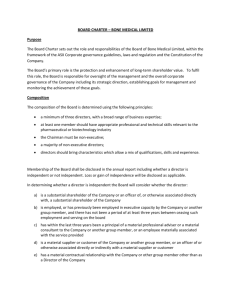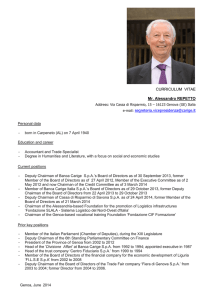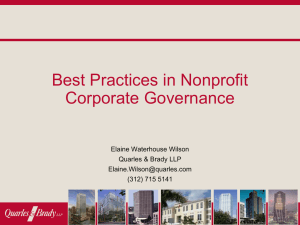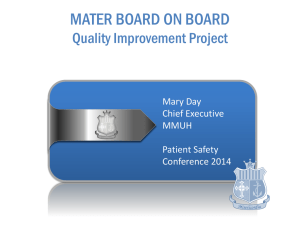Nome della presentazione su due righe
advertisement
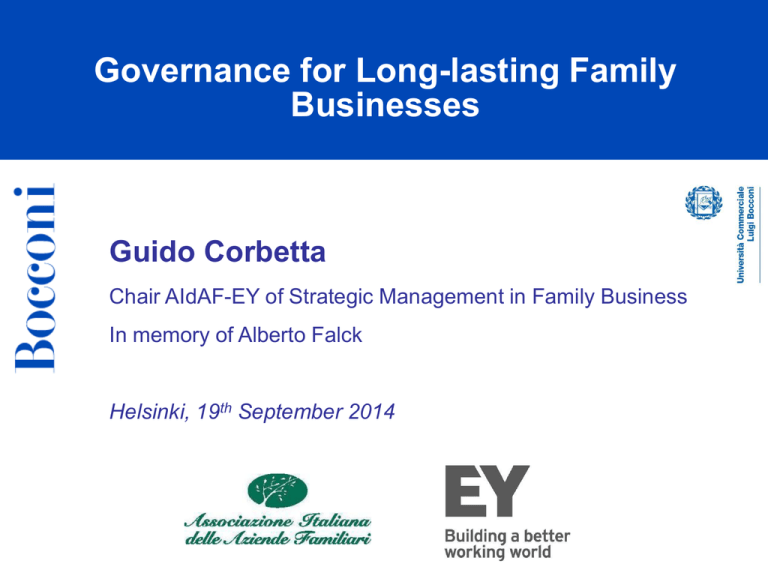
Governance for Long-lasting Family Businesses Guido Corbetta Chair AIdAF-EY of Strategic Management in Family Business In memory of Alberto Falck Helsinki, 19th September 2014 A dynamic vision of family and corporate governance Ownership stage Family office Entrepreneurial family Family foundation Family council Cousin consortium Family protocol Family meetings Second generation Shareholders’ agreements Ownership organization (Family holding) Founder Board of Directors Corporate governance activity -2- Corporate Governance as a system The successful governance of a company is a system of “actors” (and processes): • Shareholders’ assembly • Board of Directors • Chairman • CEO • Committees of the Board (Executive, Audit, Human Resources, …) Legal context and group structure are relevant -3- Models of Boards of Directors High B.o.D in transformation Governing B.o.D Directors’ competencies Useless B.o.D Dangerous B.o.D Low Limited Role of the Board within the decision process Relevant -4- Roles of Boards of Directors The Board of Directors doesn’t have direct managerial tasks, but governing tasks which may be aggregated into legal role strategic role In a “governing” Board of Directors it is necessary to develop both roles -5- The outside directors It is difficult (or impossible ?) to organize a “governing” Board of Directors without outside directors who can be: Affiliated (friends, ex managers, …) Unaffiliated or independent Outside members can support the company and the owning family -6- The roles of outside directors for the company In terms of control: to stimulate responsibility self-discipline and a sense of to promote the introduction of reporting tools more sophisticated performance and connected to management to monitor potential confllicts of interest to secure minorities’ interests to secure other stakeholders’interests -7- The roles of outside directors for the company In terms of strategy to acquire new experiences and competencies to have stimulating counterparts formulation of goals and strategies during the to improve the quality of the decision making process through deep-reaching questions to improve the quality of people evaluation processes to improve relations among other stakeholders and the business to improve the reputation of the company -8- Outside directors can complete the skills missing from the board (1/2) According to directors of family-owned and nonfamily-owned businesses: Are there skills missing or insufficiently represented on this board? Is there a formal process of determining what skills are required for the board and, therefore, for new directors? Source: Boris Groysberg and Deborah Bell -9- Outside directors can complete the skills missing from the board (2/2) What are the skills missing from boards? Source: Boris Groysberg and Deborah Bell - 10 - The roles of third parties for the family Third parties unaffiliated of the owning family are very useful for family governance because they help: to define the right rules in the relations among the company and the family to plan in a professional way the succession process to manage some “strategic traps” that may happen because of the entrepreneur getting older to manage with less emotional bias the tensions which may arise among family shareholders, managers and non managers to train successors - 11 - Zegna case: corporate governance Board Governance: Four “independent” Board members out of 8, with age limit rule Audit Committee and Compensation Committee Group Governance: Executive Committee: top management, of which one third is foreign, meets 4 times per year Zegna Convention: all worldwide executives meet 2 times a year (of which one at our Milan Headquarters) - 12 - Zegna case: family governance Entry of the next generation: Admission rules tied to education, competence and passion: university degree, foreign languages and work experience in other companies for at least 3 years Young Generation Committee: meets twice a year under the guidance of our Chairman Paolo Zegna and with the presence of experts in Family Business to move the fifth generation towards the Group. - 13 - De Agostini case: family governance (1/2) The Assembly of the shareholders has approved the “Rules for the IV generation”. According to these rules, members of this generation could have different roles: Managers: a candidate must reach some significant results in the managerial career outside, before entering in the Group Part time employees: each branch of the family can candidate two members for part time employment Suppliers or consultants of the companies of the Group (with some limitations). - 14 - De Agostini case: family governance (2/2) To prepare all the members of the IV generation to their ownership responsibilities, a Committee IV Generation has been established. The Committee is composed by 8 members of the IV generation (4 olders and 4 youngers) and organizes actvities for all the members of the IV generation. An Implementation Committee is in charge of all the development process of the IV generation. The Committee is composed by the Chairman of the Group, the Vice Chairman in charge of the relationships with the owners, the non family CEO, the head of the Committee IV Generation, three consultants expert in family business and in head hunting. - 15 - Pay attention ! Before asking an outsider to join it is useful to get to know each other independent in his/her judgments motivated a balanced person morally upright used to working in businesses of larger size with experiences in family business - 16 -

